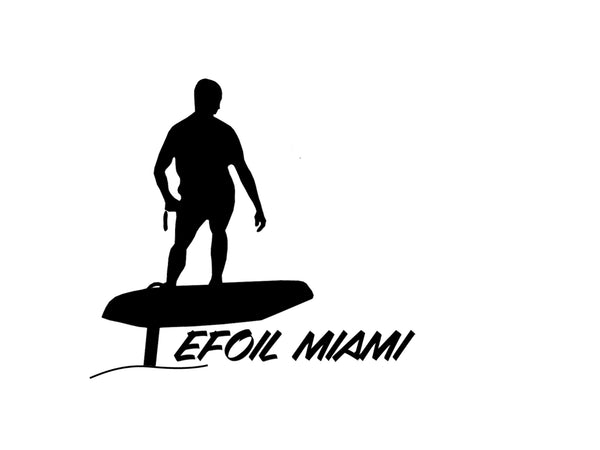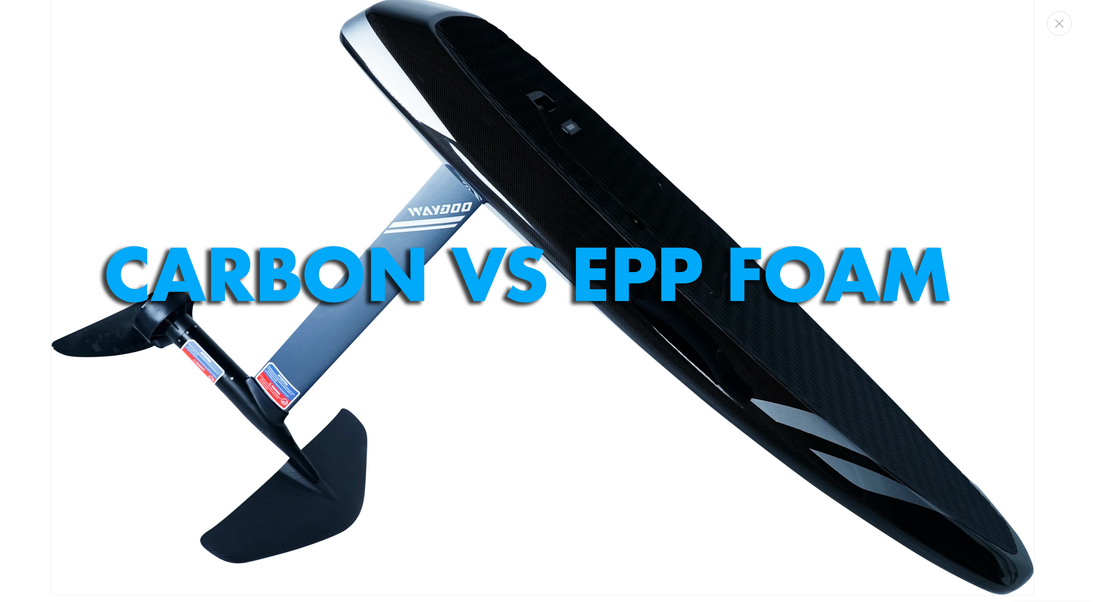Waydoo Carbon Vs. EPP Foam Flyer One Evo and Flyer One Plus
The biggest difference between Waydoo's Carbon and EPP foam eFoil boards lies in their materials, which affect performance, durability, weight, and cost.
The Waydoo Carbon eFoil board is a high-end, performance-oriented option made from carbon fiber, known for its strength and rigidity. The board is stiffer and more responsive. Weighing 34.4 lbs (15.62kg), it is heavier than the EPP foam board but still lighter than many fiberglass alternatives. The carbon fiber construction enhances maneuverability, speed, and agility, making it ideal for advanced users and those who want a higher quality eFoil with no expenses spared.
On the other hand, the Waydoo Flyer One EPP board is designed for durability, lightweight handling, and user-friendliness. It's our choice eFoil for teaching lessons here in Miami. Made from Expanded Polypropylene foam and reinforced with an aluminum alloy frame, the eFoil board weighs only 21.6 lbs (9.8kg), making it lighter and easier to carry than the carbon board. This is a huge plus for smaller riders when transporting the eFoil to the water.
The molded foam construction reinforced with an aluminum frame provides high impact resistance, allowing the board to absorb and recover from impacts without permanent damage. This makes it ideal for rough conditions and potential contact with obstacles if you have lots of family using and transporting the board. There are pros and cons to each. In this blog we'll expand on everything you need to consider between these two boards.
Here's a detailed comparison:
Should I buy the Carbon Waydoo or the EPP Foam?
Should I get the Waydoo Carbon?
The Waydoo Carbon board is a premium, performance-oriented option that leverages the strength and rigidity of carbon fiber. 'Rigidity' in this context refers to the board's ability to maintain its shape and resist bending under pressure, which enhances its performance. Carbon fiber is known for its high strength-to-weight ratio, making the board stiffer and more responsive. Although it weighs 34.4 lbs (15.62kg), heavier than the EPP foam board, it is still lighter than many fiberglass alternatives. The construction involves layers of carbon fiber fabric impregnated with resin and cured to form a robust structure. This results in a board with superior maneuverability, speed, and agility, ideal for advanced users.
However, carbon fiber's durability comes with a caveat: it can crack with misuse under severe stress or sharp impacts, and repairs can be costly. A typical repair process involves getting in touch with a surf repair shop experienced in dealing with carbon fiber repairs, which can cost more than a simple fiber glass repair. Its lower impact resistance compared to EPP foam makes it more susceptible to dings and cracks. Despite these considerations, carbon board also carries a certain status and aesthetic appeal, making it a desirable choice for those who value quality and prestige.
The Carbon Waydoo costs more, but you can expect a stiffer, more performance-oriented board. While carbon is typically the lightest construction material, it weighs more than the Waydoo EPP foam board. Weighing in at 34.4lbs / 15.62kg compared to the 21.6lbs / 9.8kg Waydoo EPP.

- Material: Made from carbon fiber, a high-strength, lightweight material known for its rigidity and durability.
- Construction: Built with layers of carbon fiber fabric that are impregnated with resin and cured to form a strong, rigid structure.
- Weight: Generally lighter than fiberglass eFoils due to the properties of carbon fiber, which provides a high strength-to-weight ratio.
- Maneuverability: Lighter boards are easier to maneuver and can offer better performance in terms of speed and responsiveness. The Waydoo Carbon board, offers excellent maneuverability due to its stiffness and lightweight. Think of transfering engrgy from your legs, though the board, into the mast and into the hydrofoil wings. Simply put, you get more responce from carbon.
- Strength: Carbon is an incredibly durable material and superior in strength compared to standard fiberglass construction. Note that carbon is more expensive to repair if you manage to damage it.
- Durability: It is highly durable under everyday use but can be prone to damage if subjected to sharp impacts, such as crashing into a jetty, or severe stress, such as droping it onto rocks. Carbon fiber can crack under these conditions. You would have to crash your board into a rock Jetty or something, but it is a consideration if you will have many people using the eFoil who might lack situational awareness.
- Impact Resistance: Lower than EPP foam, making it more susceptible to dings and cracks.
- Performance: Its superior performance is due to its stiffness and lightweight. It is ideal for advanced users looking for speed, agility, and responsiveness.
- Status: Let's be honest: carbon is about more than performance. A quality carbon board makes a statement. Whether you want something quality for the boat or on the dock, carbon is the apex of board design.

Should I get the Waydoo EPP Foam:
The Waydoo Flyer One EPP board is designed with your comfort and confidence in mind. Made from Expanded Polypropylene foam, it's a testament to durability and lightweight handling. Reinforced with an aluminum alloy frame, it strikes the perfect balance between rigidity and flexibility, ensuring a smooth and secure ride. Weighing only 21.6 lbs (9.8kg), it's significantly lighter than the carbon board, making it a breeze to carry and handle. The molded foam construction provides high impact resistance, allowing the board to absorb and recover from impacts without permanent damage, giving you peace of mind even in rough waters.
Unlike carbon or fiberglass boards, EPP foam is incredibly durable and does not suffer from water ingress issues. This makes the EPP foam board low-maintenance and highly resilient, ideal for rough use and environments where the board might frequently hit obstacles. Its lightweight nature and forgiving characteristics make it an excellent choice for beginners, as it is softer for falls and easier for smaller riders to manage. Overall, the EPP foam board offers a balance of performance and practicality, making it suitable for many users.
The Waydoo Flyer One EPP is incredibly strong and lightweight for a foam board. Reinforced with an aluminum alloy frame, you can expect incredible performance with the rigidity of the aluminum and the forgiveness of the foam. Contrary to what you might think, the Waydoo EPP board is only 21.6 pounds, a whole 13 pounds lighter than its carbon counterpart.
- Material: Made from Expanded Polypropylene, a lightweight, flexible, and highly durable foam material. The EPP foam is reinforced with an aluminum alloy frame.
- Construction: The foam is molded into shape and offers a high degree of impact resistance while being lightweight.
- Weight: Lighter than carbon fiber boards and easier for smaller riders to carry.
- Durability: The Epp foam is incredibly durable, and its soft nature makes it impact-resistant. If you manage to damage it, you won't have to worry about repairs. Unlike carbon boards or fiberglass, you don't have to worry about water seeping in from a crack.
- Impact Resistance: High impact resistance makes it a good choice for rough use and environments where the board might frequently hit obstacles. It can absorb and recover from impacts without permanent deformation.
- Beginner Friendly: The foam is a more forgiving beginner board. It's softer for falls, lighter for smaller riders to carry to the water, and you don't have to worry about damaging it.
Where can I try the Waydoo Evo eFoil?
Come take an eFoil lesson with us in Miami and we can show you the range of Waydoo eFoils and more. If you have any questions about what eFoil is right for you I'm happy to help. Feel free to call, shoot me a text or an email me anytime. My name is Chris Bobryk and I'm stoked to help.

